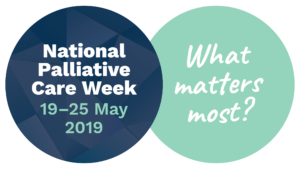Making informed choices for what you want

Dying is as normal a part of life as being born. While many of us are quick to rally around a new parent and offer help, supporting family or friends at the other end of life’s cycle is often not as forthcoming. What Matters Most, the theme of National Palliative Care Week (May 19-25), asks all Australians to reflect on what would be most important to them if they became seriously unwell.
Palliative Care Australia (PCA) board chair Dr Jane Fischer understands that as a community, we can find death and dying a difficult and emotional subject to discuss, but says away to begin such a conversation is to ask loved ones about what would matter most to them if they became seriously unwell.

‘‘People need to start making informed choices about what they want, not just in terms of their medical treatment but also in terms of goals they’re trying to achieve with the time they have left,’’ says Dr Fischer.
‘‘Getting people to think about ‘what would matter to me if I was in that situation?’ and ‘how do we make sure we’ve got a great palliative care system?’ are key aims of National Palliative Care Week.’’
Having worked in palliative care for more than 30 years, Dr Fischer has seen it all, including the death of her father.
‘‘My father was diagnosed with multiple myeloma and died five years ago,’’ she says.
‘‘We had discussions all the way along and he was treating it actively, achieving his goals and always talking about future options. When the treatments started impacting on his quality of life, he decided, ‘no’, he didn’t want any more treatment, he just wanted to enjoy the time he had left.
‘‘He was very clear that he didn’t want to be in hospital. It was all about being supported to die at home. I have an amazing family. My three sisters and Dad’s 13 grandchildren were all involved with his last few weeks.
‘‘Professionally, I often see loved ones making decisions, and people at the end of life having unnecessary or unwanted treatments, because family weren’t aware of what their wishes were.’’
Palliative Care Australia’s Dying to Talk Discussion Starter guides you through talking with a loved one about your (and their) end-of-life wishes.
‘‘It’s a very non-threatening way to start a discussion. I know, from experience, the older generation is not particularly good about talking about it,’’ says Dr Fischer.
‘‘With my Mum, it was a great way of sitting down and informally saying, ‘Look, Mum, here are some things to think about and let’s start having a conversation’. We need to normalise the whole end-of-life discussion as we do for parents planning for a birth.’’
Dr Fischer knows the difference palliative care makes to people and their families and stresses the need for it to be a national health priority.
‘‘Palliative care can have a really positive impact on a person’s quality of life, but not everyone in our community has access to the services they need. Nor are they aware of what palliative care services can deliver. That’s something we need to address,’’ she says.
‘‘We need to make sure we raise awareness about high-quality palliative care services and then we’ve actually got to make sure people can access the care, wherever they are.’’
Talk to those close to you about end of life and what matters to you — understand palliative care and the choices you have.
National Palliative Care Week runs from 19 - 25 May 2019 - visit the #NPCW19 events page to see what's happening in your area.

